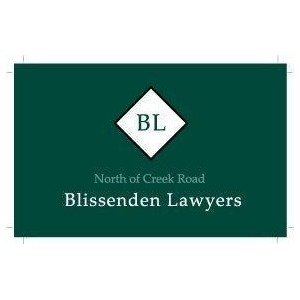Best Foreclosure Lawyers in Moonah
Share your needs with us, get contacted by law firms.
Free. Takes 2 min.
Free Guide to Hiring a Real Estate Lawyer
List of the best lawyers in Moonah, Australia
About Foreclosure Law in Moonah, Australia
Foreclosure, also known as mortgage default, occurs when a loan borrower fails to make necessary payments and the lender seeks to recover the remaining loan balance by selling the borrower's property. In Moonah, Australia, foreclosure law is regulated by Tasmania’s Conveyancing and Law of Property Act 1884 and the Supreme Court Civil Procedure Act 1932. The laws under these acts spell out the meticulous procedures that lenders must adhere to before they can take control of or sell a borrower's property.
Why You May Need a Lawyer
You may require a foreclosure lawyer if you have defaulted on your loan payments and received a notice of default, or have been served with legal documents known as a Claim or Writ from your lender. Lawyers provide assistance in understanding the legal language in these documents, exploring possible foreclosure defenses, and evaluating various options like loan modification or refinance. Furthermore, having a lawyer may be beneficial if you need to file for bankruptcy to stop the foreclosure.
Local Laws Overview
Local laws in Moonah, Australia, require the lender to send a notice of default to warn the borrower before starting the foreclosure process. The borrower has a default judgment period, which is typically about six months, to repay the arrears. If a solution isn't found within this period, lenders may proceed to further legal action. If a decision cannot be reached through mediation, the lender can enforce a court-ordered sale of your property. A prominent feature of local foreclosure law is that the borrower can halt foreclosure at any stage by paying off the outstanding amount and associated legal costs.
Frequently Asked Questions
Can I stop the foreclosure process once it has started?
Yes, you can stop the foreclosure process at any stage by paying back the amount you owe and any legal expenses. It is also beneficial to seek legal assistance as early as possible.
What happens if I cannot repay the amount owed?
If you cannot settle the amount owed, the lender can take possession of your property or conduct a court-ordered sale. The proceeds from the sale are used to pay off the remaining mortgage debt.
Can I save my house if I file for bankruptcy?
While bankruptcy doesn't eliminate your mortgage, it may buy you some time by stopping the foreclosure temporarily. Be aware, however, this is a complex area and you should seek legal advice for your particular circumstances.
What rights do I have during the foreclosure process?
As a borrower, you have the right to repay your debts and halt the foreclosure process at any stage. You can also contest the procedure in court on various grounds like incorrect procedure or unjust conduct by the lender.
What happens if my property sale doesn't cover the mortgage debt?
If your property sale doesn't cover the entire mortgage debt, you may still owe the lender what is termed as a 'Mortgage shortfall'. It is important you seek legal advice in this situation.
Additional Resources
For extra support, you might consider reaching out to Legal Aid Tasmania for free or low-cost legal services. Other organizations like the Financial Ombudsman Service, Australian Securities, and Investments Commission, as well as the Tasmanian Justice Department, provide helpful resources to understand and handle foreclosure.
Next Steps
If you're facing foreclosure, the first course of action should be talking to your lender and discussing possible solutions. If this doesn't work or if you've received legal documents, consider getting legal advice. This could come from a private lawyer, community legal service, or organizations like Legal Aid Tasmania. Understand your rights, explore options like loan modification, refinance, or even bankruptcy (if applicable), and actively participate in the process.
Lawzana helps you find the best lawyers and law firms in Moonah through a curated and pre-screened list of qualified legal professionals. Our platform offers rankings and detailed profiles of attorneys and law firms, allowing you to compare based on practice areas, including Foreclosure, experience, and client feedback.
Each profile includes a description of the firm's areas of practice, client reviews, team members and partners, year of establishment, spoken languages, office locations, contact information, social media presence, and any published articles or resources. Most firms on our platform speak English and are experienced in both local and international legal matters.
Get a quote from top-rated law firms in Moonah, Australia — quickly, securely, and without unnecessary hassle.
Disclaimer:
The information provided on this page is for general informational purposes only and does not constitute legal advice. While we strive to ensure the accuracy and relevance of the content, legal information may change over time, and interpretations of the law can vary. You should always consult with a qualified legal professional for advice specific to your situation.
We disclaim all liability for actions taken or not taken based on the content of this page. If you believe any information is incorrect or outdated, please contact us, and we will review and update it where appropriate.








